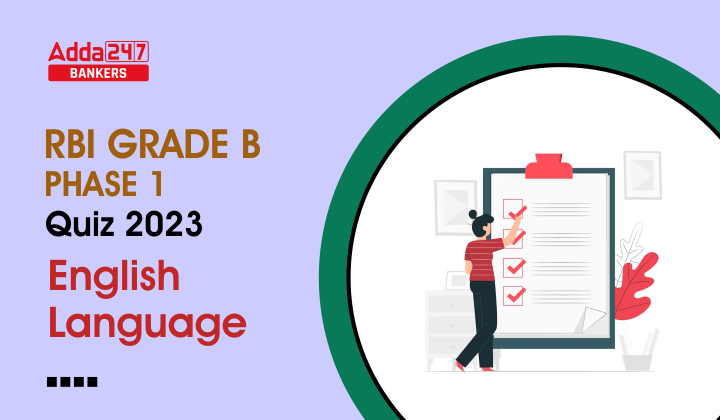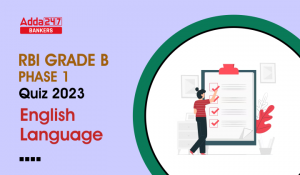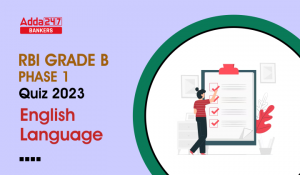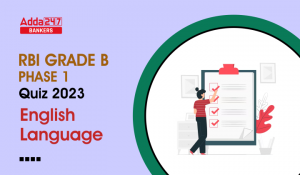Directions (1-5): In the following passage against each number four words are suggested in bold which may or may not fit into the sentence contextually. These numbers are printed below the passage and against each, five options are given. Find out the most appropriate alternative reflecting the word which doesn’t fit into the blank appropriately and thus fail to give a contextual meaning to the paragraph. If no such error is there mark (e) i.e. “No error” as your answer choice.
Q1. The Prime Minister, Mrs. Indira Gandhi, told (A) the RajyaSabha today [December 12, New Delhi] that the conditions (B) which President Ayub of Pakistan had made in his abetment (C) of no-war pact with India “have made it rather difficult (D) for us to consider it.” (1) President Ayub had said that certain things should be decided first (A) before a no-war pact was signed (B). Normally, a pact was signed first, and issues were settled (C) later through peaceful confrontations (D), Mrs. Gandhi told the House. (2) Mrs. Gandhi was replying (A) to Mr. K.P. Mallikarjunudu who had asked (B) about the Government’s reaction (C) to Mr. Ayub’soffer (D) of no-war pact. (3) Replying to Mr. Joachim Alva whether the Government had ever crucified (A) the financial and other implications (B) of a joint defence arrangement (C) between India and Pakistan for the whole sub-continent, Mrs. Gandhi said Pakistan was a member (D) of military blocs and so it was a hypothetical question. (4) Replying to Mr. Mohan Dharla, who wanted (A) that India should never have any matches (B) with Pakistan on the Kashmir issue, Mrs. Gandhi said, “I don’t think there is any confusion (C) whatsoever. Our views on Kashmir are very clear. But that does not mean that we should take an attitude of refusing (D) to have any talks with Pakistan, when we can restate them (our views) again. (5)”
(a) A
(b) B
(c) C
(d) D
(e) No error
Q2. The Prime Minister, Mrs. Indira Gandhi, told (A) the RajyaSabha today [December 12, New Delhi] that the conditions (B) which President Ayub of Pakistan had made in his abetment (C) of no-war pact with India “have made it rather difficult (D) for us to consider it.” (1) President Ayub had said that certain things should be decided first (A) before a no-war pact was signed (B). Normally, a pact was signed first, and issues were settled (C) later through peaceful confrontations (D), Mrs. Gandhi told the House. (2) Mrs. Gandhi was replying (A) to Mr. K.P. Mallikarjunudu who had asked (B) about the Government’s reaction (C) to Mr. Ayub’soffer (D) of no-war pact. (3) Replying to Mr. Joachim Alva whether the Government had ever crucified (A) the financial and other implications (B) of a joint defence arrangement (C) between India and Pakistan for the whole sub-continent, Mrs. Gandhi said Pakistan was a member (D) of military blocs and so it was a hypothetical question. (4) Replying to Mr. Mohan Dharla, who wanted (A) that India should never have any matches (B) with Pakistan on the Kashmir issue, Mrs. Gandhi said, “I don’t think there is any confusion (C) whatsoever. Our views on Kashmir are very clear. But that does not mean that we should take an attitude of refusing (D) to have any talks with Pakistan, when we can restate them (our views) again. (5)”
(a) A
(b) B
(c) C
(d) D
(e) No error
Q3. The Prime Minister, Mrs. Indira Gandhi, told (A) the RajyaSabha today [December 12, New Delhi] that the conditions (B) which President Ayub of Pakistan had made in his abetment (C) of no-war pact with India “have made it rather difficult (D) for us to consider it.” (1) President Ayub had said that certain things should be decided first (A) before a no-war pact was signed (B). Normally, a pact was signed first, and issues were settled (C) later through peaceful confrontations (D), Mrs. Gandhi told the House. (2) Mrs. Gandhi was replying (A) to Mr. K.P. Mallikarjunudu who had asked (B) about the Government’s reaction (C) to Mr. Ayub’soffer (D) of no-war pact. (3) Replying to Mr. Joachim Alva whether the Government had ever crucified (A) the financial and other implications (B) of a joint defence arrangement (C) between India and Pakistan for the whole sub-continent, Mrs. Gandhi said Pakistan was a member (D) of military blocs and so it was a hypothetical question. (4) Replying to Mr. Mohan Dharla, who wanted (A) that India should never have any matches (B) with Pakistan on the Kashmir issue, Mrs. Gandhi said, “I don’t think there is any confusion (C) whatsoever. Our views on Kashmir are very clear. But that does not mean that we should take an attitude of refusing (D) to have any talks with Pakistan, when we can restate them (our views) again. (5)”
(a) A
(b) B
(c) C
(d) D
(e) No error
Q4. The Prime Minister, Mrs. Indira Gandhi, told (A) the RajyaSabha today [December 12, New Delhi] that the conditions (B) which President Ayub of Pakistan had made in his abetment (C) of no-war pact with India “have made it rather difficult (D) for us to consider it.” (1) President Ayub had said that certain things should be decided first (A) before a no-war pact was signed (B). Normally, a pact was signed first, and issues were settled (C) later through peaceful confrontations (D), Mrs. Gandhi told the House. (2) Mrs. Gandhi was replying (A) to Mr. K.P. Mallikarjunudu who had asked (B) about the Government’s reaction (C) to Mr. Ayub’soffer (D) of no-war pact. (3) Replying to Mr. Joachim Alva whether the Government had ever crucified (A) the financial and other implications (B) of a joint defence arrangement (C) between India and Pakistan for the whole sub-continent, Mrs. Gandhi said Pakistan was a member (D) of military blocs and so it was a hypothetical question. (4) Replying to Mr. Mohan Dharla, who wanted (A) that India should never have any matches (B) with Pakistan on the Kashmir issue, Mrs. Gandhi said, “I don’t think there is any confusion (C) whatsoever. Our views on Kashmir are very clear. But that does not mean that we should take an attitude of refusing (D) to have any talks with Pakistan, when we can restate them (our views) again. (5)”
(a) A
(b) B
(c) C
(d) D
(e) No error
Q5. The Prime Minister, Mrs. Indira Gandhi, told (A) the RajyaSabha today [December 12, New Delhi] that the conditions (B) which President Ayub of Pakistan had made in his abetment (C) of no-war pact with India “have made it rather difficult (D) for us to consider it.” (1) President Ayub had said that certain things should be decided first (A) before a no-war pact was signed (B). Normally, a pact was signed first, and issues were settled (C) later through peaceful confrontations (D), Mrs. Gandhi told the House. (2) Mrs. Gandhi was replying (A) to Mr. K.P. Mallikarjunudu who had asked (B) about the Government’s reaction (C) to Mr. Ayub’soffer (D) of no-war pact. (3) Replying to Mr. Joachim Alva whether the Government had ever crucified (A) the financial and other implications (B) of a joint defence arrangement (C) between India and Pakistan for the whole sub-continent, Mrs. Gandhi said Pakistan was a member (D) of military blocs and so it was a hypothetical question. (4) Replying to Mr. Mohan Dharla, who wanted (A) that India should never have any matches (B) with Pakistan on the Kashmir issue, Mrs. Gandhi said, “I don’t think there is any confusion (C) whatsoever. Our views on Kashmir are very clear. But that does not mean that we should take an attitude of refusing (D) to have any talks with Pakistan, when we can restate them (our views) again. (5)”
(a) A
(b) B
(c) C
(d) D
(e) No error
Directions (6-10): In each of the following questions, there are two phrases/group of words marked in bold which are either grammatically incorrect or not in formation with the correct sentence structure. Choose the best alternative among the four options given below each question to replace these two phrases to make the sentence meaningful and grammatically correct. In case both the phrases are correct, choose (e) i.e. ‘No correction required’ as your answer.
Q6. The government on Thursday has moved a proposal in Parliament for an additional Rs.41,000 crore to recapitalise public sector banks, below the already budgeted Rs.65,000 crore, Finance Minister Arun Jaitley told a press conference.
(a) moving a proposal; across
(b) moved a proposal; over and above
(c) to move a proposal; for
(d) has been moving a proposal; while
(e) No correction required
Q7. The RLSP had been contested and won three seats in the 2014 Lok Sabha election, which was sweeping the NDA, political alliance created by the BJP.
(a) The RLSP is contesting; being sweeping the NDA
(b) The RLSP has contested; sweep the NDA
(c) The RLSP had contested; swept by the NDA
(d) The RLSP will contest; to sweep the NDA
(e) No correction required
Q8. While directing the police to deploy adequate personnel to ensure that there was no breach of law and order, Justice Chakraborty said the BJP would be liable for loss of lives or property.
(a) deploying adequate personnels; in loss for lives or property
(b) deployed adequate personnel; across loss in lives or property
(c) has deployed adequate personnel; on loss for lives or property
(d) is deploying adequate personnel; at losing across lives or property
(e) No Correction required
Q9. Mr. Rai is a 1992 batch IPS of Gujarat cadre and currently serving on central deputation, heading the Counter Insurgency and Anti-Terrorism School of the Central Reserve Police Force in Chittoor in the southern State of Andhra Pradesh.
(a) serving on central deputation; at Chittoor in the southern State
(b) had served for central deputation; for Chittoor at the southern State
(c) will serve for central deputation; across Chittoor on the southern State
(d) will be serving for central deputation; on Chittoor at the southern State
(e) No Correction required
Q10. Commercial banks who extended loans to the tune of Rs.50,000 crore to the troubled Infrastructure Leasing and Financial Services (IL&FS) have requested the RBI relax norms forbad loan provisioning.
(a) who extends loans on; relaxing norms
(b) that extended loans across; had relaxed norms
(c) which extended loans for; has relaxed norms
(d) that extended loans to; to relax the norms
(e) No correction required
Directions (11-15): Given below is a paragraph in which certain words are highlighted, a blank is present and is followed by questions. Answer the questions which follow the paragraph.
Generally, trees are cut down for building roads. But in Arunachal Pradesh, a village is hoping that a flourishing tree will help spur the construction of a road. Residents of Kallek village in Siang district have developed a track to the State’s largest tree, standing almost 65 metres tall.
The trekking track, the brainchild of 14 households in Kallek, was fuelled by the hope that the tree, called AtangAne, and the variety of birds it attracts would _____(A)_____ trekking enough for the local authorities to act on their 20-year-old promise to pave the road from the highway to the village. (B)Kallek, Pasighat(1) by the Adi community (2), is 48 km from inhabited (3), the Siang district headquarters (4). The last 10 km from the highway to the village, marked by a tough and hilly terrain, has been in the making for two decades now. “AtangAne, which has grown into a small (C) tree today was once a fragile sapling, brought here from Myanmar. It was planted by a village elder,” said Tamang Tamuk, the head ‘gaonburah’ (village elder) of Kallek.
Q11. Which of the following ironies is being talked about in the above passage?
(a) A village in Arunachal Pradesh is still not connected to a nearby highway.
(b) A 20-year-old promise to pave the road from the highway to the village remain unfulfilled
(c) Generally, trees are cut down for building roads but in the village, a flourishing tree will help spur the construction of a road.
(d) A once fragile sapling turns into the state’s largest tree.
(e) None of the above
Q12. What comment could be made on the attitude of the residents of Kallek Village of Arunachal Pradesh?
(a) Optimism
(b) Sadness
(c) Happiness
(d) Frustration
(e) Dishonesty
Q13. Which of the following words would fill the blank marked as (A)?
(a) discredit
(b) earn
(c) develop
(d) increase
(e) popularize
Q14. In the sentence marked as (B), four words are highlighted as (1), (2), (3) and (4). Which of the following options indicates the correct interchange of the words to make the sentence contextually and grammatically correct?
(a) 2-3
(b) 1-3
(c) 1-4
(d) 1-2
(e) 2-4
Q15. Which of the following words must replace the word marked as (C)?
(a) restless
(b) truthful
(c) bold
(d) huge
(e) useful
Solutions
S1. Ans. (c)
Sol. abetment [noun] means ‘the quality of encouraging or assisting (someone) to do something wrong, in particular to commit a crime.’
The given passage seems to talk about Prime Minister Mrs. Indira Gandhi giving her opinion on a proposal of no-war pact with Pakistan.
The word ‘abetment’ clearly doesn’t fit with the context of the passage. The correct word should have been ‘offer’.
Hence, option (c) is the correct answer.
…which president Ayub of Pakistan had made in his offer of no-war pact with India…
S2. Ans. (d)
Sol. The context of the sentence where the word ‘confrontations’ is present seems to suggest that Mrs. Gandhi is saying that normally, a pact wa signed first, and issues were settled later through peaceful negotiations.
A confrontation can never be peaceful.
So, the presence of the word ‘confrontation’ is incorrect from contextual point-of-view.
The correct word should have been ‘dialogue’ or ‘negotiation’.
Hence, option (d) is the correct answer.
…a pact was signed first, and issues were settledlater through peaceful negotiations…
S3. Ans. (e)
Sol. All the highlighted words are contextually correct and there is NO word which is incorrect from contextual point of view. Hence, option (e) is the correct answer.
S4. Ans. (a)
Sol. ‘crucify’ [verb] means ‘put (someone) to death by nailing or binding them to a cross, especially as an ancient punishment’;
The word ‘crucified’ seems inappropriate from a contextual point of view.
Hence, option (a) is the correct answer.
…whether the Government had ever examined the financial…
S5. Ans. (b)
Sol. The word ‘matches’ seems inappropriate from a contextual point of view.
The context of the passage seems to suggest that Mr. Mohan Dharla is someone who wanted that India should never have any talks with Pakistan on the Kashmir issue.
Hence, option (b) is the correct answer.
…that India should never have any talks with Pakistan on the Kashmir issue…
S6. Ans. (b)
Sol. The phrase ‘the government on Thursday’ suggests that the tense of the sentence should be past tense. So, the phrase ‘has moved a proposal’, insinuating present tense, is grammatically incorrect.
Also, the usage of ‘additional’ in the phrase ‘for an additional Rs. 41,000 crore’ suggests that this money, Rs. 41,000 crores, should be over and above the already budgeted Rs. 65,000 crores.
Among the given options, option (b) supplies correct corrections.
Hence, option (b) is the correct answer.
S7. Ans. (c)
Sol. The phrase ‘The RLSP had been contested’ is grammatically incorrect. The phrase ‘in the 2014 Lok Sabha election’ suggests that the tense of the sentence is Past Tense, either Simple Past or Past Perfect. Among the given alternatives, option (c) provides the correct alternative.
Similarly, the phrase ‘sweeping the NDA’ is contextually incorrect.
The tone of the sentence suggests that the clause starting with ‘which was…’ is in Passive Voice form of a Simple Past tense.
Among the given alternatives, option (c) provides the correct alternative for the second highlighted phrase.
S8. Ans. (e)
Sol. The given sentence is grammatically and contextually correct and does not require any correction.
Hence, option (e) is the correct answer.
S9. Ans. (a)
Sol. The first highlighted phrase ‘serving on central deputation’ is grammatically correct and doesn’t require any correction. The second highlighted phrase ‘in Chittoor in the southern State’ is grammatically incorrect and requires correction.
The usage of the preposition ‘in’ is incorrect. The correct preposition to be used is ‘at’. Among the given alternatives, option (a) provides the correct substitute.
Hence, option (a) is the correct answer.
S10. Ans. (d)
Sol. The first highlighted phrase ‘who extended loans to’ is grammatically incorrect.
The usage of the relative pronoun ‘who’ is incorrect. The correct pronoun to be used is ‘that’. The reason is ‘Commercial banks’ are not human beings and ‘who’, as a relative pronoun, can only have human beings as its antecedents.
The second highlighted phrase ‘relax norms’ is grammatically incorrect. The finite verb for the subject ‘Commercial banks’ is ‘requested’. The tone of the sentence suggests that the second verb ‘relax’ should not be a finite verb, but rather should be an infinitive preceded by ‘to’.
Among the given alternatives, option (d) provides the correct corrections.
Hence, option (d) is the correct answer.
S11. Ans. (c)
Sol. Irony [noun] means ‘a state of affairs or an event that seems deliberately contrary to what one expects and is often wryly amusing as a result’;
The answer to the question can be derived from the first two sentences of the first paragraph.
Generally, it is expected that construction of a road would led to the cutting of trees but what happens in a village of Arunachal Pradesh is that the state’s largest tree will help spur the construction of a road.
Among the given options, only option (c) correctly fulfills the definition of ‘irony’.
Hence, option (c) is the correct answer.
S12. Ans. (a)
Sol. Optimism [noun] means ‘hopefulness and confidence about the future or the success of something’;
Pessimism [noun] means ‘a tendency to see the worst aspect of things or believe that the worst will happen’;
Happiness [noun] means ‘the state of being happy’;
Frustration [noun] means ‘the feeling of being upset or annoyed as a result of being unable to change something’;
Dishonesty [noun] means ‘deceitfulness shown in someone’s character or behaviour’;
A promise was made 20 years ago to the residents of Kallek Village that a road would be constructed that would join the village to the Highway, but the promise is still unfulfilled.
But instead of feeling sadness or frustration for it, the residents of Kallek Village have taken an initiative and built a trek to the state’s largest tree which is in the village, and the residents believe that the trek will help spur the construction of a road connecting the village to the highway.
A positive attitude which includes hope is shown by the residents of Kallek Village.
Among the given options, the word ‘optimism’ correctly expresses the attitude of the villagers of Kallek Village.
Hence, option (a) is the correct answer.
S13. Ans. (e)
Sol. Popularize [verb] means cause (something) to become generally liked;
Increase [verb] means become or make greater in size, amount, or degree;
Develop [verb] means grow or cause to grow and become more mature, advanced, or elaborate;
Earn [verb] means obtain (money) in return for labour or services;
Discredit [verb] means harm the good reputation of;
The context of the sentence where the blank appears, and the preceding sentences suggest that the notion behind constructing trekking path to the state’s largest tree is that it would popularize trekking and would attract tourists to the extent that authorities would get motivated to fulfill their 20 year old promise to construct a road connecting the village to the Highway.
Among the given options, the word ‘popularize’ provides the correct contextual and grammatical sense to the blank.
Hence, option (e) is the correct answer.
S14. Ans. (b)
Sol. The usage of the word ‘Pasighat’ at (1) is incorrect as per the context of the sentence. The word at the position marked as (3) which is ‘inhabited’ provides correct contextual sense if placed at (1). Also, the context of the sentence suggests that the position marked as (3) requires the name of a place, and ‘Pasighat’ seems to be that name.
Hence, option (b) is the correct answer.
S15. Ans. (d)
Sol. The context of the sentence suggests that the word marked as (C) would be replaced by an adjective.
The word ‘once’ which follows the (C) would help us determine the word which would replace the word (C). The phrase following the word ‘once’ is ‘a fragile sapling, brought here from Myanmar’. The word which would fill the blank should be an ANTONYM of the word ‘fragile’. The word which is currently at the position (C) ‘small’ is NOT an ANTONYM of ‘fragile’. Among the given options, the word ‘huge’ is the correct word which would fill the blank.
Hence, option (d) is the correct answer.
Click Here to Register for Bank Exams 2021 Preparation Material





 English Language Quiz For For RBI Grade ...
English Language Quiz For For RBI Grade ...
 English Language Quiz For For RBI Grade ...
English Language Quiz For For RBI Grade ...
 English Language Quiz For For RBI Grade ...
English Language Quiz For For RBI Grade ...










